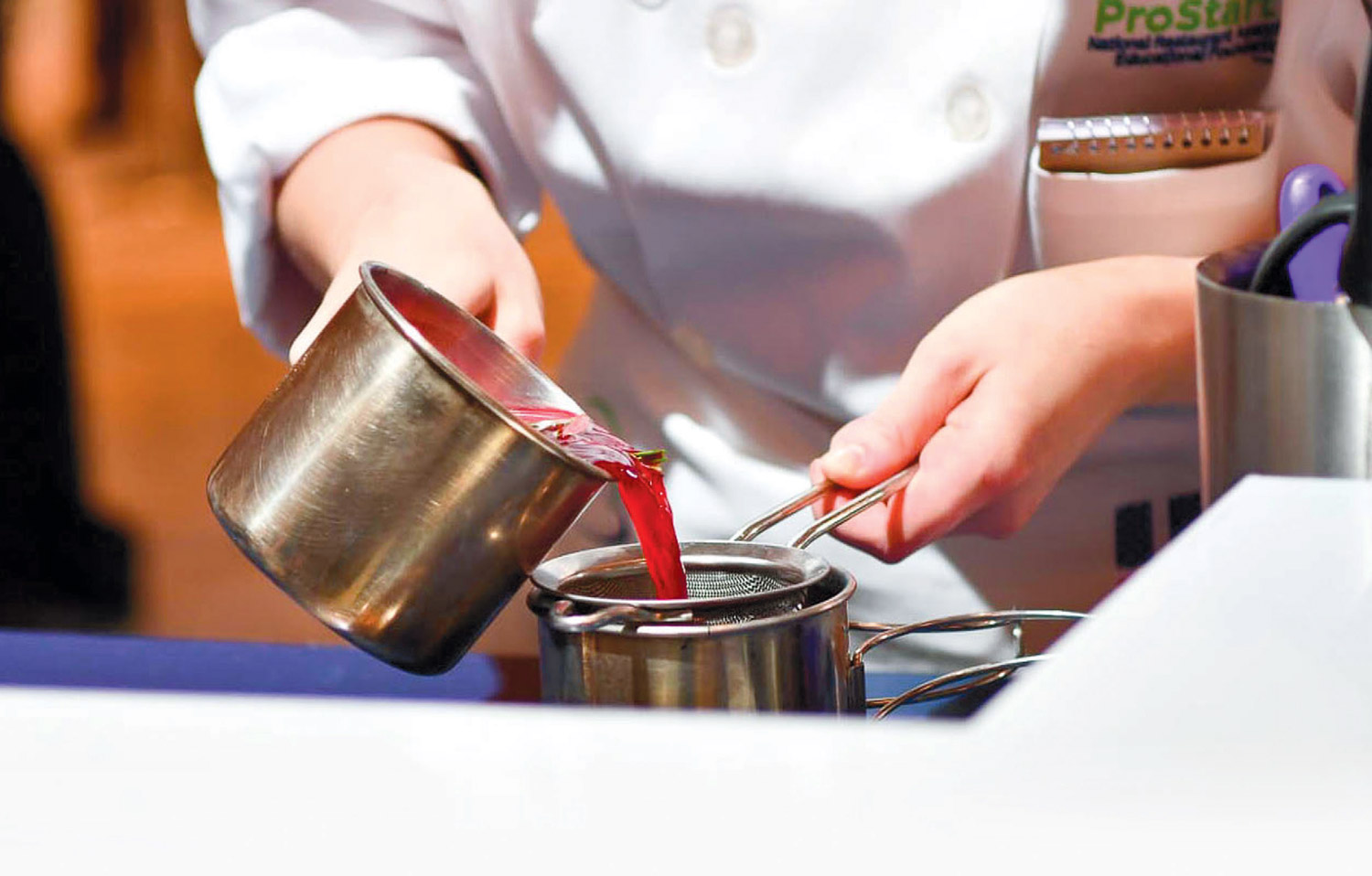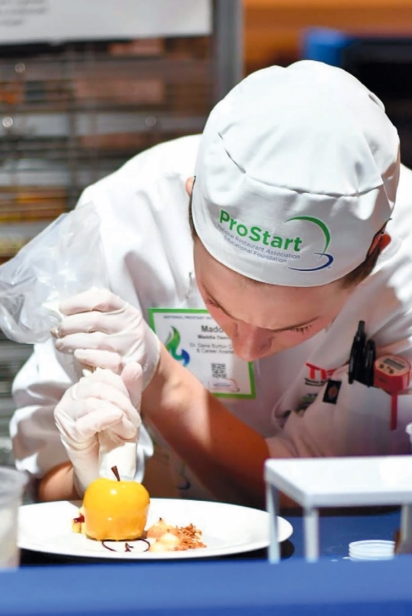Learn to Cook Like a Pro
High school program starts students on a culinary career path
There’s a long-standing debate in the culinary world over whether success in the restaurant industry is best obtained by pursuing a formal culinary school education or by going the baptism- by-fire route and working up the ranks in a high-pressure restaurant kitchen.
What many participants immersed in this debate don’t know, however, is that there is a high school program called ProStart allows eager culinary minds to experience the realities of working in the restaurant industry and also to achieve a thorough culinary education at the same time.
ProStart, a hands-on culinary program put on by the Texas Restaurant Association (TRA) under the umbrella of the National Restaurant Association, teaches students about working in, cooking in and running successful restaurants. During their time in ProStart, students are immersed in real-life situations and scenarios, including running restaurants within their own schools, which aim to prepare them for the challenges of working in the tough-as-nails culinary industry.
According to TRA, the restaurant industry employs an estimated 1.34 million people in Texas—approximately 10% of the state’s workforce. The sheer size of this growing field confirms the need for early education and formal training, says Yvonne Loya-Saenz, director of education and Texas ProStart coordinator for TRA.
“ProStart is a career-driven culinary arts and restaurant management curriculum with 265 schools throughout Texas,” she says. “Nationally, the ProStart program reaches about 140,000 students and 1,800 schools. Texas actually has the largest [program] in the nation.”
Available as a two-year or four-year program, ProStart introduces students to commercial-grade kitchens under the guidance of teachers who often either have restaurant experience or home-economics teaching backgrounds. Through these instructors, students develop important culinary and restaurant-management foundations, including knife skills, teamwork, menu planning, marketing, costing and much more.
“The students come out of ProStart with an increased level of life skills, such as the importance of showing up on time, taking responsibility of their work schedules and taking ownership of the job at hand,” Loya-Saenz says. The program “develops an important maturity in these students that prepares them to enter the workforce.”
Chelsea Gumm, a ProStart teacher at Miller Career & Technology Center in Katy, says she knows the program is effective from her own experience in the industry. Having worked her way up the ranks at Outback Steakhouse, Gumm eventually made the transition from the famous chain to the ProStart kitchen in order to teach a new generation of ambitious culinary minds.
“I start out the year telling my students that the biggest difference between a cook and a chef is a cook understands recipes and can work in a kitchen, but a chef understands how the recipe works, why the recipe works and also has a knowledge base that is more than just the food. It’s the operation, it’s food costs, it’s labor, it’s marketing, how to sell your menu, how to put a menu together and this curriculum does a great job of integrating the business side with the practical application of culinary knowledge,” Gumm says.
During their ProStart education, students also obtain their ServSafe certification at the manager’s level. This food-service certification is both a resume booster and a vital requirement for those hoping to advance in the field.
“There is a visible growth you see from these kids in the program, and they all come in at different skill levels. Some kids have never even been allowed to cook in the kitchen and have virtually no skills, only a desire to learn. Then you have the kids who grew up in the kitchen and are already ahead of the game,” she says. “ProStart teaches them dedication, teamwork and personal responsibility—all the skills that employers from all industries are looking for in their employees, which you don’t necessarily learn in a traditional classroom.”
One of Gumm’s former students, Arturo Hernandez, said that the lessons he learned during his years in ProStart helped forge his burgeoning career path. “The program strengthened all of us, gave us thicker skin and prepped us for the pressures in the kitchen,” Hernandez says. “It was a taste of the real world starting in high school.”
Hernandez’s interest in cuisine began when he was young, helping his single mother make ends meet by selling her homemade cuisine like tacos al pastor and fajitas door to door in their apartment complex. Hernandez says that although a seed of interest was planted at that time, he wasn’t fully prepared to enter the culinary world until he completed ProStart in 2012.
“Without ProStart I wouldn’t understand the reasoning behind everything we do in the restaurant, and I might not have pushed myself as hard or I may have even given up. From there on it’s like a domino effect of thinking how different your life would be,” he says.
Through the years of working in the professional kitchen, Hernandez has moved up the ranks in places like Truluck’s and Caracol and now serves as the sous chef at the prestigious Steak 48 in Highland Village. “I can’t believe at 25 years old I am where I am,” Hernandez says. “I went up the ladder fast, and I know my years in ProStart prepared me for where I am today.”
As both a soon-to-be ProStart teacher and current restaurant owner, Carlos Ramos says he believes wholeheartedly in the power of a ProStart education. “These aren’t theoretical lessons they’re teaching,” Ramos says. “Students learn how to run a restaurant and also experience how to do service—what’s in the front of the house, what’s in the back of the house—and they go through all the stations. They are going to leave this program prepared to go into the next chapter of their lives, whether that’s in the culinary field or not.”
Though he has worked as a culinary instructor at Milby High School in Houston for three years, this will be the first year Ramos teaches the ProStart program. Over the past summer, Ramos has taken intensive training and instruction to prepare for teaching ProStart in the 2019–20 school year. He says that along the way he learned lessons he could even implement at his family-owned Peruvian restaurant, Latin Bites. “As someone who owns and runs a restaurant, I can say with confidence that ProStart prepares students for this business,” Ramos says.
As to the effectiveness of Texas’s ProStart program compared to other states’, readers need not look further than the National Restaurant Association competition held earlier this year where Texas’s culinary and restaurant management teams both won first place in their respective competitions. “That’s the first time that’s ever happened,” Loya-Saenz says. “It just goes to show we are putting on a great program and training an important part workforce here in Texas.”
For more details about the program and how to get involved, head to the website texasprostart.com.






